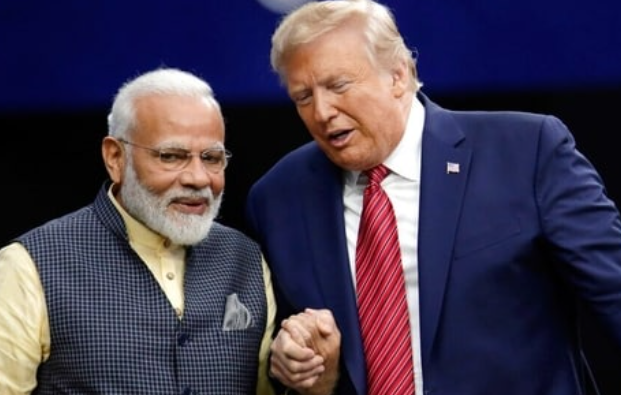In a major boost to global counterterrorism efforts, India has strongly welcomed the United States’ decision to designate The Resistance Front (TRF) — a proxy of Pakistan-based terror group Lashkar-e-Taiba — as a Foreign Terrorist Organization and Specially Designated Global Terrorist. The Indian Ministry of External Affairs hailed the move as a timely and strategic step that reflects the deepening counterterrorism cooperation between India and the U.S. The designation not only cuts off TRF’s financial and operational networks but also paves the way for global action against Pakistan-supported terrorist outfits. With the Pahalgam terror attack still fresh in memory, India is pushing for broader international recognition of TRF’s threat and increased pressure on Pakistan through FATF and the United Nations.
India Welcomes U.S. Decision to Designate TRF as Global Terrorist Group and Lashkar-e-Taiba Proxy
In a major diplomatic and counterterrorism development, the Government of India has welcomed the United States Department of State’s decision to designate The Resistance Front (TRF) as a Foreign Terrorist Organization (FTO) and a Specially Designated Global Terrorist (SDGT). This move is seen as a clear recognition of India’s long-standing position that TRF is a proxy outfit of the Pakistan-based terror group Lashkar-e-Taiba (LeT) and is responsible for numerous acts of terrorism in India.

The Ministry of External Affairs (MEA) of India issued a strong statement appreciating the U.S. decision and called the designation a “timely and important step.” The MEA stated that TRF has been involved in a number of terror-related activities, most notably the Pahalgam terror attack. According to Indian authorities, the TRF operates with support from across the border and continues to threaten regional peace and stability.
The MEA also reiterated India’s consistent emphasis on global cooperation in the fight against terrorism. The statement stressed the importance of dismantling terrorist infrastructure and cutting off sources of financing and support to terror networks. It welcomed the move as a reflection of the growing and deepening counterterrorism partnership between India and the United States.
Earlier in the day, three significant statements were issued from India in response to the development. The first statement came from the Indian Embassy in Washington, D.C., expressing gratitude to the U.S. for recognizing the threat posed by TRF. This was followed by a statement from India’s External Affairs Minister, Dr. S. Jaishankar, who highlighted India’s zero-tolerance stance on terrorism. The third statement came from the Ministry of External Affairs itself, emphasizing that this designation underlines close cooperation between India and the U.S. on security matters.
The implications of this designation under U.S. domestic law are significant. Once a group is listed as a Foreign Terrorist Organization and as a Specially Designated Global Terrorist, several immediate restrictions come into play. These include freezing of financial assets, prohibition of funding or support from U.S. persons or institutions, arms embargoes, and visa restrictions on individuals associated with the group. TRF’s international funding and operational capabilities are now expected to be severely restricted.
This move also paves the way for a broader international push against TRF. As of now, only the U.S. and India have listed the TRF as a terrorist organization under their respective domestic laws. Indian diplomatic sources indicate that this step is expected to create momentum for other countries to follow suit and blacklist the group. This would, in turn, strengthen India’s case at the Financial Action Task Force (FATF) to highlight Pakistan’s continued harboring and support of terror groups operating under new names and banners.
India is also likely to use this development to push for TRF’s inclusion in the global terror list under United Nations Security Council (UNSC) procedures. However, challenges persist. Pakistan is currently a non-permanent member of the UNSC, a position it will hold until December 2026. This complicates the possibility of a consensus within the UN on such designations, especially when members with veto power or political interests may choose to block or delay the process.
It is important to recall that Pakistan’s Foreign Minister had made a controversial remark in April 2025 in their Parliament, boasting that Pakistan managed to keep TRF’s name out of a UN condemnation statement related to the Pahalgam attack. This admission has not only raised international concerns but also cast a shadow on Pakistan’s credibility in fighting terrorism, especially when juxtaposed against the U.S. and Indian coordinated actions.
As the global community increasingly takes note of TRF’s activities and its affiliations with known terror networks like Lashkar-e-Taiba, India is expected to intensify its diplomatic campaign to expose Pakistan’s dual role — acting as both a professed victim and a suspected enabler of terrorism.
All eyes are now on Islamabad for a formal response to this latest development. The U.S. action marks a significant diplomatic win for India and sends a powerful signal to terror groups and their sponsors that the international community remains united against terrorism in all its forms.
Description:
India has welcomed the U.S. decision to designate The Resistance Front (TRF), a proxy of Lashkar-e-Taiba, as a Foreign Terrorist Organization and Specially Designated Global Terrorist. The move is seen as a significant step in global counterterrorism cooperation and a diplomatic win for India.

